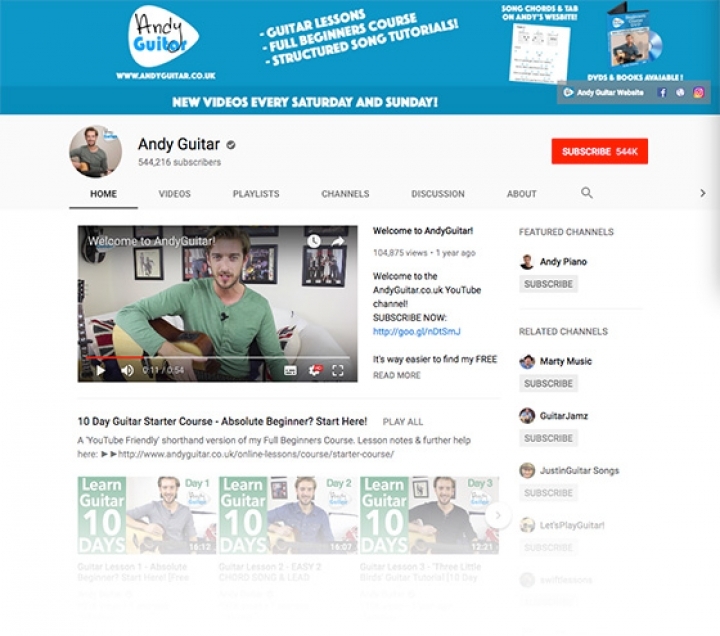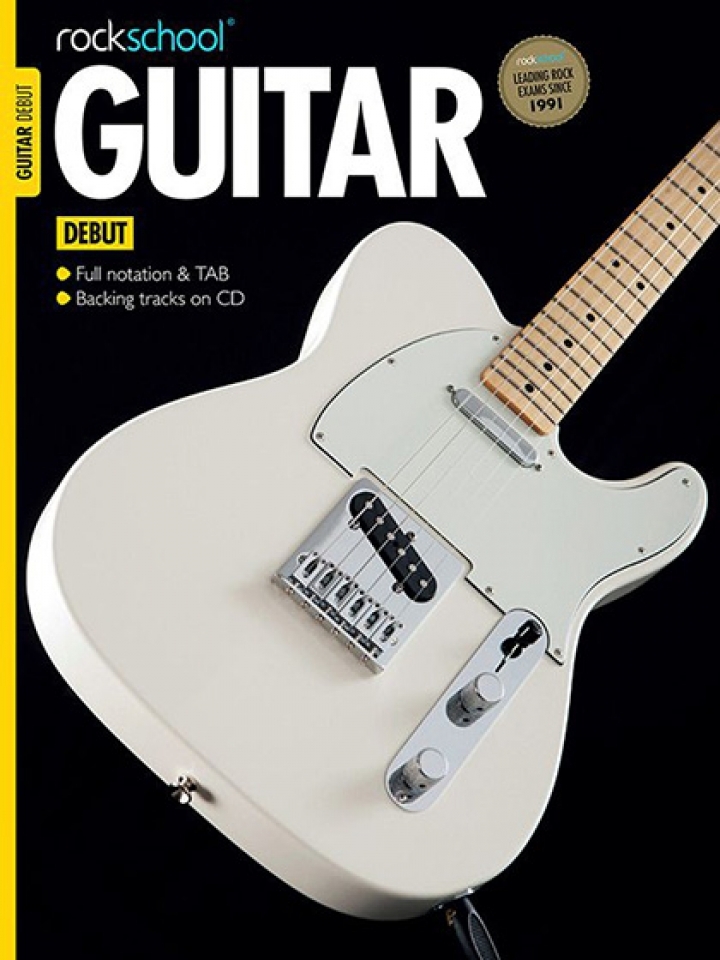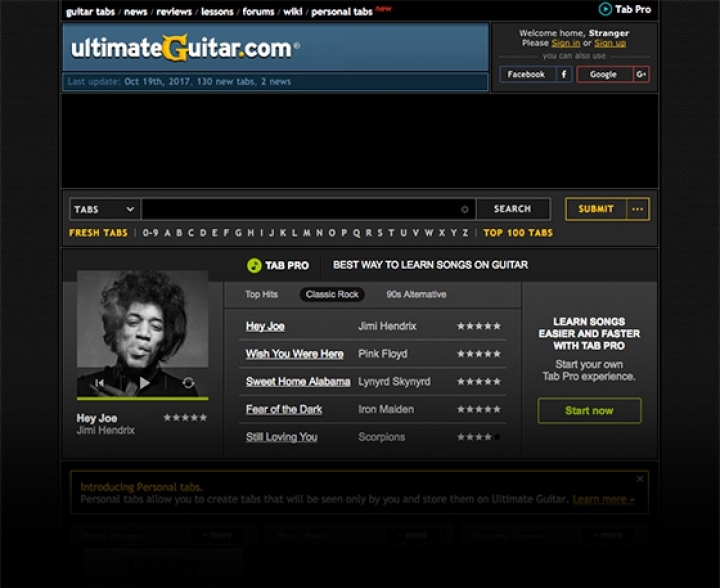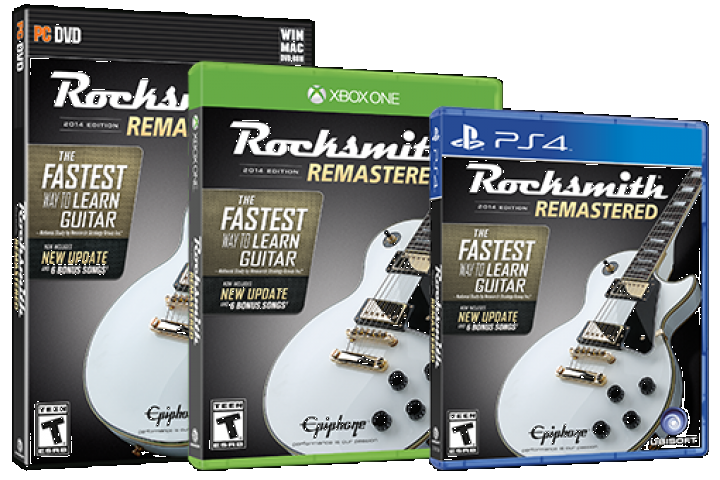
Learning to play the guitar is brilliant. It encourages ambition, dedication, teamwork and confidence amongst a multitude of other life-skills. Not to mention, guitars are cool. But learning guitar can feel a little bit daunting initially, especially when there seems to be so many different routes teaching you.
In this article, Sam Cross looks into some of the most common methods for learning to play, and debunks their place in the modern world...
A Good Teacher
This, above everything else, is my single best bit of advice. The key here is to find, not just a good player, but also a teacher that connects with the student. From personal experience, the right teacher can do twice the work in half the time. Never be too afraid to say if it’s not working out with someone – it gives them a chance to adapt and become more universal or focus on what they do best. Making sure to find a teacher with similar tastes to you is always good too, as they can empathise with your music taste and set you on a path that will ignite your inner fan at the same time.
It can be hard finding a reputable guitar teacher, but there are some good things to look out for. Most will have at the very least a Facebook page these days, and people can rate these accordingly. Be sure to take account of reviews too, as most people will openly praise or criticise tutors they have experienced. Don’t be afraid to try a few different tutors too and be conscious to ask questions of them to find out a bit more about them.
You can also search a database of registered guitar tutors at http://www.rgt.org/tutors/. All of the teachers listed in The Registry of Guitar Tutors (RGT) have completed registration forms detailing their teaching and playing experience and references have been successfully applied for.

Online Videos
In the aftermath of YouTube, there is almost nothing imaginable that doesn’t have a tutorial video online somewhere. Guitar tuition took off really quickly in this medium, with lots of key players posting everything from technique breakdowns to individual song part lessons. One of the best things about video tuition is that it helps visual learners, who can see someone doing what they wish to replicate. I used to find these a great help in conjunction with a real-life tutor, as it can start to feel like a second perspective. It’s a great, fast way to learn songs and techniques, with the only real downsides being that you’re not getting eyes onto your specific technique, and that you have to trust that the person who uploaded the video is correct.
The world of online videos is vast and constantly changing, but some classic guys worth checking out include Marty Schwartz, Guitareo and Andy Guitar. It’s also notable that there are lots and lots of guitar-based tutorials that focus on other things like tuning, restringing and maintaining your guitar, all of which are incredibly useful to know.
Books
There is a huge number of music books available, all with the aim of making it easier for you to learn guitar. Almost every famous band, album or song will have a licensed music book somewhere, and these can provide great aid for learning parts to your favourite songs. Not only that, but there are some great sources of material for learning general music knowledge too. There are far too many to name, but some respectable names to look out for include Rockschool whose grade books have become a great yardstick for assessing progress. My personal tuition was via this method and, although it was not without annoyances, it was definitely a great way of learning solid techniques and foundations to take into other areas of my playing.
Also, don’t take the …for Dummies books for granted, as they can be a fantastic method of learning core techniques easily. With that said, the market is heavily saturated with teaching books at great prices. The important thing is to do what you can to find a book that is understandable, as some are written for more advanced players and as such will use heavier terminology. My recommendations are looking at books that tackle some really core things in good detail. CAGED system guides, scale diagrams, chord shapes are all things that a handy book can be beneficial with cementing. Oh, and when you progress, buy yourself a Real Book to learn chart reading from where it peaked.
Print medium is definitely dying. But don’t underestimate the benefit of something tangible in front of you when learning an instrument – getting your mind away from the distractions of the Internet when trying to learn new things is really beneficial and will almost certainly help with remembering new information.


Online Tabs
Online tabs. What a coup! A veritable smorgasbord of music, totally free, right there a few clicks away from you, in the ethers of the internet… yeah, there really is nothing musical the internet didn’t make free! For my generation, Ultimate Guitar was the place to be for learning songs. Didn’t matter what you were looking for, it was almost definitely there, a scrawl of dashes and numbers that misaligned after about a bar and half.
The premise here was that anyone could put their own tabs up online, so if you happened to work out a tune, you could share it with the world. The issue, then, was that people’s ears are not always trustable, and often tabs were uploaded with mistakes. And that’s even before you get into the tab/notation debate.
Essentially, my standpoint is thus: if you want to learn a song, particularly as a beginner, you should do that in the way that works best for you. Use Ultimate Guitar if you must, because that will give you the drive to learn more, keep playing and get better. That drive, particularly in younger players, should be fuelled as well as possible. Learning notation, sight reading etc. can all come later on; to start with, the elation of knocking out an old Blink-182 riff for days on end is much more important.
Video Games
Not including Guitar Hero, but some modern offshoots allow use of real instrumentation to play along. Rocksmith and Yousician are the two most notable of these, and bill themselves as ‘the fastest way to learn guitar’. The premise is simply to utilise a real guitar with the video game addictiveness of Guitar Hero’s early work, essentially so the learnt skills have some basis in value outside of the game itself. The idea is a nice one (I will admit to never having used either of these personally) but I have a couple of sticking points. Firstly, there is no-one to individually critique you. One of the best things about a human teacher is their interaction and ability to refine incredibly small facets of what you do to make your technique really good. Unfortunately, your console cannot do that in the same way, and from what I’ve seen, this can leave learners with poor technique that looks uncomfortable and could lead onto RSI’s if not corrected properly.
Secondly, the gameplay screen has to feel like a regular video game, utilising colours to specify strings or notes needed for the part. Now while this works in the context of the game, as soon as the player is left without their coloured conveyor belt of notes, they will almost surely be dumbfounded with no lasting knowledge of what to play. Better focus on teaching notes and memorising the riffs would be better in the long run.
Finally, the gameplay I’ve seen on these seems very generous. This is not to say we need to discourage aspiring players, but to praise something that is incorrect is just as unfair as players grow up and try to move forward – no one is going to give you a ‘Great Job!’ when you play out of key in the real world.
For me, these games are a love-hate thing. I totally understand where the market for them exists and if used alongside tuition from an experienced, respected guitar tutor, I can definitely see their place as a big engaging force. The issue comes when they are relied upon for total tuition, as there simply isn’t enough pressure put on the player from a console to improve techniques.

BITESIZE TIPS
Sam Cross
This new blog is presented by the team at Sound Technology Ltd, a leading distributor of musical instruments and pro audio equipment in the UK and ROI.